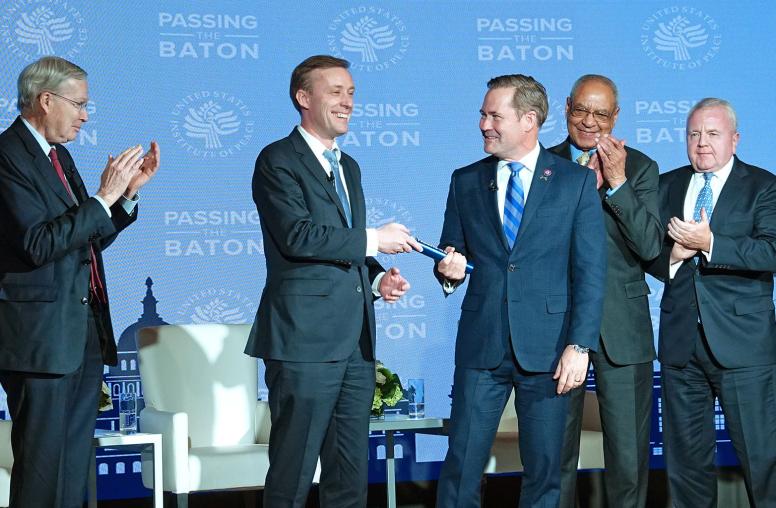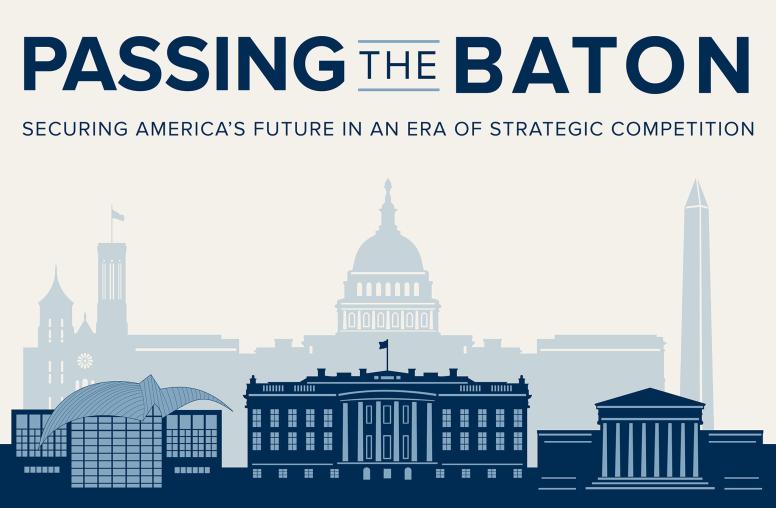"'Lone Ranger' No More"
Institute Board Chair Chester A. Crocker and President Richard H. Solomon rethink diplomacy and defense issues facing the United States in a special essay.
The Bush administration is taking office at a time when the country faces a task similar to the one it took on after World War II and in the early years of the Cold War: restructuring its dealings with the world and assuming global leadership in the creation of new political and security institutions and policies.
U.S. diplomacy and defense posture must adapt to the challenges posed by ethnic and religious conflict, political destabilization caused by rapid economic change, humanitarian crises in failed states, security threats from "rogue states," terrorism and the proliferation of weapons of mass destruction. This will require new ways of thinking and organizing. We should not be faced with the choice of either sending in troops (alone) or sitting on the sidelines.
The United States needs to develop new approaches to international conflict management and peace-building that take full advantage of its global diplomatic reach, expertise and credibility in peacemaking and its unrivaled capacity to build and sustain winning coalitions.
President-elect Bush did open some doors on these issues in his major foreign policy statements during the fall. In stressing the need for "humility" in our dealings with the world, he recognized the need to build effective international coalitions. And in asserting that we cannot be the world's "911," he implicitly pointed the way toward greater reliance on our political and economic strengths and the need to bolster conflict management efforts by various international and regional organizations. In short, Lone Rangerism won't do the job.
What is required for an effective restructuring of our diplomatic and defense policies?
- Keep political action and diplomacy at the forefront of foreign policy. U.S. diplomacy has been impoverished in recent years by a failure to invest in and sustain a first-class Foreign Service. This is as much a matter of changing the way we use our political and economic influence as it is of funding for the State Department. Our diplomats need to be trained as conflict managers and mobilized to lead and coordinate action with key allies. The goals are to keep conflicts from getting out of control in fragile regions, to mount sustained mediation initiatives and to use concerted pressure (as well as incentives) on troubled societies and brutal regimes.
In promoting such a proactive foreign policy, we need to do a better job of coordinating diplomatic action with economic and military capabilities. And we need to strengthen bridges to nonviolent civil society groups. Remember that Marcos, Milosevic and Suharto were brought down by "people power." We can do much to stimulate and support such relatively inexpensive approaches to dealing with rogue or corrupt leaders. The alternative to indiscriminate use of our military power is not disengagement; it is selective and tailored application of military and other coercive means in support of overarching political goals and strategies. The remedy for "imperial overstretch" is not withdrawal; it is concerted strategic engagement with our closest partners on better ways to share the burdens -- and credit.
We need more effective negotiators -- backed by economic assets and our military -- to prevent international conflicts from turning violent and to make peace agreements stick. Military preponderance is central to our global leadership, but it is not by itself a strategy. Integrating diplomatic, economic and military capabilities will require new planning and coordinating mechanisms among competing government agencies. And it will need a new level of bipartisan support and funding from Congress.
- Refurbish our alliances and international and regional organizations. If there is to be peace in East Asia, we need active and supportive allies in Japan and Korea, and a cooperative China. In Europe, post-Cold War security requires a vital NATO firmly linked to the United States and a Russia that sees us as a supporter of its reemergence as a responsible world power. In Africa, humanitarian crises require effective coalitions and international organizations, if we are not to repeat the shameful performance in Rwanda.
- Restructure our military. While high-tech weaponry can create a more effective and efficient defense, our national fascination with technology distracts us from the need to put military capabilities in the service of a national security and foreign policy strategy. Our advanced weaponry is so advanced that we are in danger of making our alliances obsolete, because our allies' communications and weapons systems can't operate with ours. Our military deals uneasily with the requirements of peace operations, humanitarian disasters, the drug war, cyber war and terrorists with weapons of mass destruction. The major investments required for missile defense and other advanced weapons platforms must be meshed with these more imminent security threats; and the military services will not take easily to restructuring, retraining and retooling.
- Collect intelligence intelligently. In today's world, high-quality intelligence is more critical than ever. Narco terrorism, proliferation of weapons of mass destruction and effective diplomacy and political action require us to exploit human intelligence and sound analysis, as well as open-source materials via the Internet just as fully as we do technical intelligence. Only the United States has the potential to strengthen the operations of allies and international organizations with information resources.
Developing a broad strategic concept that will pull together the uses of these elements of our national power -- and in the process build the public and congressional support required to sustain and fund them -- is likely to be as much of a challenge as institutional reform and tactical policy innovations.
But without these innovations in our diplomacy and defenses, we are likely to fight the wrong battles and dissipate our resources. And we might very well find ourselves fighting or negotiating alone. The new administration has the opportunity and the responsibility to recast our dealings with the world.
Chester A. Crocker is the James R. Schlesinger Professor of Strategic Studies at Georgetown University's School of Foreign Service and serves as chairman of the Board of Directors of the United States Institute of Peace. From 1981-89, Crocker served as assistant secretary of state for African Affairs, managing a regional bureau responsible for relations with 46 nations. Crocker is also the author of many books and articles including co-editor with Fen O. Hampson and Pamela Aall of Herding Cats: Multiparty Mediation in a Complex World published by the Institute in 1999.
Richard H. Solomon, president of the U.S. Institute of Peace, served as assistant secretary of state for East Asian and Pacific Affairs and worked on the National Security Staff under Henry Kissinger from 1971 to 1976. Solomon is also the author of many books and articles including, Chinese Negotiating Behavior: Pursuing Interests Through 'Old Friends', published by the Institute in 1999.



